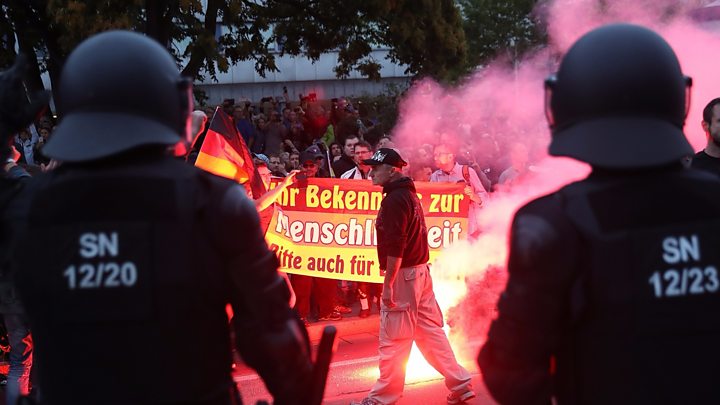 Image copyright
Image copyright
Getty Images
Alaa Sheikhi said ahead of sentencing that he was not responsible for the death of Daniel Hillig
A Syrian man has been sentenced in Germany to nine and a half years in prison over the fatal stabbing of a man in Chemnitz last year.
Alaa Sheikhi, 24, was found guilty of “joint manslaughter and serious physical injury” over the death of Daniel Hillig, a 35-year-old carpenter.
A second suspect, an Iraqi, is thought to have fled Germany after the attack.
The case led to violent protests in Chemnitz, where far-right Alternative for Germany (AfD) has strong support.
Ahead of his sentencing on Thursday, Sheikhi denied any responsibility for the death of Hillig.
Speaking through an interpreter, he said: “I can only hope that the truth is brought to light here and that a just verdict is pronounced.”
Sheikhi, who had reportedly remained silent throughout the trial, told German public broadcaster ZDF in a telephone interview just two days before the verdict that he did not touch either the victim or the knife that killed him.
“I just ran away,” he said, adding: “I swear on my mother I did not touch him.”
The sentencing comes one year after thousands of neo-Nazis marched through Chemnitz, where AfD hopes to increase its share of the vote in elections in Saxony and neighbouring Brandenburg on 1 September.
What do we know about the attack?
In the early hours of Sunday 26 August 2018, a fierce fight broke out between “multiple nationalities” on the sidelines of a street festival in the eastern German region of Chemnitz, near the Saxony capital of Dresden.
It remains unclear what triggered the brawl – police at the time dismissed online rumours that Hillig, who had a German mother and a Cuban father, had been defending a woman from sexual assault.
During the fight, Hillig was stabbed and critically injured. He later died in hospital of heart and lung wounds.
Two other German men with him at the festival, aged 33 and 38 at the time, were seriously hurt, police said.
Sheikhi, who arrived in Germany in 2015, was arrested hours after the attack, along with another Iraqi man, who was released due to a lack of evidence.
What about the protests?
Friends of the victim later told local media that misreporting following the incident had helped fuel far-right protests in the region.
Several xenophobic assaults were reported in the days after the attack. They were described as racist “hunts” and images emerged showing demonstrators chasing people and flinging bottles and fireworks.
The far-right protests, some involving thousands of people, led to violent clashes with police and counter demonstrators.

Chemnitz is a region where the AfD party and the Pegida movement are particularly strong. They deplore German Chancellor Angela Merkel’s liberal immigration policy.
In 2015, Chancellor Merkel decided to let in a record 890,000 asylum seekers. Syrians fleeing the civil war comprised the biggest group.
Chemnitz trial: Syrian jailed over stabbing that sparked German far-right riots}

